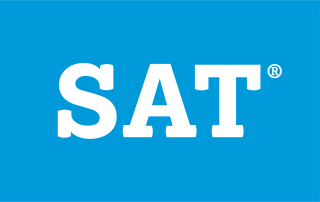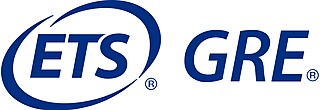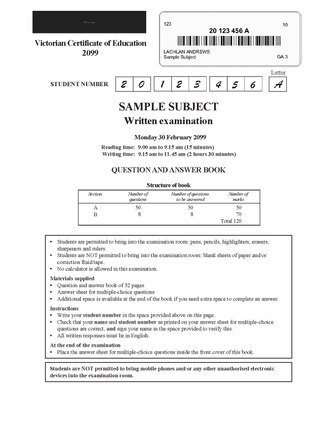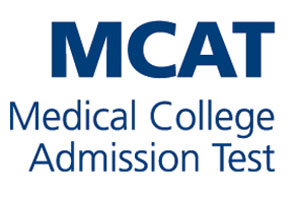
The ACT is a standardized test used for college admissions in the United States. It is currently administered by ACT, a nonprofit organization of the same name. The ACT test covers four academic skill areas: English, mathematics, reading, and scientific reasoning. It also offers an optional direct writing test. It is accepted by all four-year colleges and universities in the United States as well as more than 225 universities outside of the U.S.

The SAT is a standardized test widely used for college admissions in the United States. Since its debut in 1926, its name and scoring have changed several times. For much of its history, it was called the Scholastic Aptitude Test and had two components, Verbal and Mathematical, each of which was scored on a range from 200 to 800. Later it was called the Scholastic Assessment Test, then the SAT I: Reasoning Test, then the SAT Reasoning Test, then simply the SAT.

Matura or its translated terms is a Latin name for the secondary school exit exam or "maturity diploma" in various European countries centered around the former Austro-Hungarian Empire, including Albania, Austria, Bosnia and Herzegovina, Bulgaria, Croatia, Czech Republic, Hungary, Italy, Kosovo, Liechtenstein, Montenegro, North Macedonia, Poland, Serbia, Slovakia, Slovenia, Switzerland and Ukraine.

The Graduate Management Admission Test is a computer adaptive test (CAT) intended to assess certain analytical, writing, quantitative, verbal, and reading skills in written English for use in admission to a graduate management program, such as a Master of Business Administration (MBA) program. Answering the test questions requires knowledge of English grammatical rules, reading comprehension, and mathematical skills such as arithmetic, algebra, and geometry. The Graduate Management Admission Council (GMAC) owns and operates the test, and states that the GMAT assesses analytical writing and problem-solving abilities while also addressing data sufficiency, logic, and critical reasoning skills that it believes to be vital to real-world business and management success. It can be taken up to five times a year but no more than eight times total. Attempts must be at least 16 days apart.
The eleven-plus (11+) is a standardised examination administered to some students in England and Northern Ireland in their last year of primary education, which governs admission to grammar schools and other secondary schools which use academic selection. The name derives from the age group for secondary entry: 11–12 years.

The Graduate Record Examinations (GRE) is a standardized test that is an admissions requirement for many graduate schools in the United States and Canada and a few other countries. The GRE is owned and administered by Educational Testing Service (ETS). The test was established in 1936 by the Carnegie Foundation for the Advancement of Teaching.

The Law School Admission Test is a standardized test administered by the Law School Admission Council (LSAC) for prospective law school candidates. It is designed to assess reading comprehension, analytical reasoning, and logical reasoning. The test is an integral part of the law school admission process in the United States, Canada, the University of Melbourne, Australia, and a growing number of other countries.

The Victorian Certificate of Education is one credential available to secondary school students who successfully complete year 11 and 12 in the Australian state of Victoria as well as in some international schools in China, Malaysia, Philippines, Timor-Leste and Vietnam.
A cram school is a specialized school that trains its students to achieve particular goals, most commonly to pass the entrance examinations of high schools or universities. The English name is derived from the slang term cramming, meaning to study hard or to study a large amount of material in a short period of time. The word "crammer" may be used to refer to the school or to an individual teacher who assists a student in cramming.

The College Board is an American not-for-profit organization that was formed in December 1899 as the College Entrance Examination Board (CEEB) to expand access to higher education. While the College Board is not an association of colleges, it runs a membership association of institutions, including over 6,000 schools, colleges, universities, and other educational organizations.
University admission or college admission is the process through which students enter tertiary education at universities and colleges. Systems vary widely from country to country, and sometimes from institution to institution.
The New Jersey Assessment of Skills and Knowledge (NJASK) was a standardized test given to all New Jersey public-schooled students in grades 3-8 during (usually) March, April, or May, and was administered by the New Jersey Department of Education.

The Academy of Allied Health and Science (AAHS), established in 1996, is a small magnet public high school located in Neptune Township, in Monmouth County, New Jersey, United States. The school is one of five career academies offered by the Monmouth County Vocational School District. The school focuses on medical education for teenagers who want to pursue medical careers. Proximity to Jersey Shore University Medical Center provides students with hands-on training in a hospital setting. The school has been accredited by the Middle States Association of Colleges and Schools Commission on Elementary and Secondary Schools since 1999.
The Secondary School Admission Test (SSAT) is an admission test administered by The Enrollment Management Association in the United States to students in grades 3–11 to provide a standardized measure that will help professionals in independent or private elementary, middle, and high schools to make decisions regarding student test taking.
The Joint Entrance Examination (JEE) is an engineering entrance assessment conducted for admission to various engineering colleges in India. It is constituted by two different examinations: the JEE-Main and the JEE-Advanced.
The Psychometric Entrance Test (PET) – commonly known in Hebrew as "ha-Psikhometri" – is a standardized test that serves as an entrance exam for institutions of higher education in Israel. The PET covers three areas: quantitative reasoning, verbal reasoning and English language. It is administered by the National Institute for Testing and Evaluation (NITE) and plays a considerable role in the admissions process. A score combining students' performance on the PET with the average score of their high school matriculation tests has been found to be a highly predictive indicator of students' academic performance in their first year of higher education.
The Test for Admission into Catholic High Schools or TACHS is the admissions test for Catholic high schools in and around New York City. First used in the autumn of 2004, the test allows schools to compare students' academic abilities, including how a student performs under pressure. Some schools use it to help determine which students will receive a scholarship

The ICFESexamination, or Saber 11, is a high school exit examination administered annually in grade 11 in Colombian high schools. The exam is standardized, similar to the SAT and ACT examinations taken by high school students in the United States. The purpose of the exam is to evaluate students' aptitude in five subjects: critical reading, mathematics, social studies, science, and English. Each exam question has four multiple-choice answers, except for the English section which provides between three and eight possible answers for each question.

The Medical College Admission Test is a computer-based standardized examination for prospective medical students in the United States, Australia, Canada, and the Caribbean Islands. It is designed to assess problem solving, critical thinking, written analysis and knowledge of scientific concepts and principles. Before 2007, the exam was a paper-and-pencil test; since 2007, all administrations of the exam have been computer-based.
The Test of Mathematics for University Admission is a paper-based test sometimes used in the United Kingdom and other countries in Africa and the United States all assess the mathematical thinking and reasoning skills needed for undergraduate mathematics courses or courses featuring mathematics. A number of universities across the world accept the test as an optional part of their application process for mathematics-based courses.